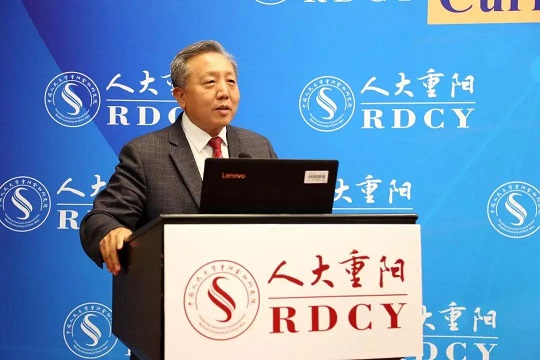Picture
Your Present Location: HOME> PictureFormer US ambassador to the Russia dialogues with Wu Xiaoqiu on Sino-US relations
On July 12th, Michael A. McFaul, Former US Ambassador to Russia and Director of Freeman Spogli Institute for International Studies at Stanford University, delivered a lecture with the theme of “Current Situation and Future Trend of Sino-US Relations”at Chongyang Institute for Financial Studies of Renmin University of China (RDCY), and had a dialogue with Professor Wu Xiaoqiu, Vice president of Renmin University of China. The dialogue was moderated by Wang Wen, Executive Dean of RDCY.

Professor McFaul questioned whether the US is now playing a new type of cold war with China. He said that the Trump administration sees China as a revisionist power, like Russia. This is wrong. It is a distorted analysis to equate Sino-US relations with the relationship between the US and the Soviet Union 50 to 60 years ago. Compared with the US-Soviet Cold War in the past, China-US relations are actually more different.
He believes that after 20 to 30 years, there will be two big powers in the international system - China and the US.
First, it is not true to say that we are in a unipolar world and the US still remains the dominant power.
Second, there are ideological competitions between China and the US. It also reflects the differences in the two systems.
Third, there is global competition in the economic system. China has the“Belt and Road”initiative and the US has the USTR trade agreement.
Fourth, after 20 to 30 years , China and the US may face the risk of military conflict.
From above perspectives, Sino-US relations have similarities with the Cold War of that year. But there are still more differences.
First, Professor McFaul believes that China has no intention to dominate the world. This is not like the Soviet Union in Cold War.
Second, in the military field, the power of the US and the Soviet Union during the Cold War was equal. However, between China and the US today, this is not the case.
Third, there are ideological differences. The Soviet Union wanted to disseminate its own communist ideology during the Cold War. But the Chinese government has no intention of it. Therefore, the competition between the US and the Soviet Union in the past was not the same as the competition between China and the US today.
Fourth, the economy of China and the US today is highly interconnected, including investment, technology, and trade. The kind of connection is enough to make China better and make the US better. This is complementary and win-win. But in the Cold War, the US and the Soviet Union almost no trade or investment.
Fifth, it is true that China's economy has grown very rapid and the great achievements in the past four decades have been a great success globally. During the Cold War, however, the Soviet Union’s economic development lagged behind the US, and the gap was very large.
Sixth, there were proxy wars during the Cold War. But China and the US have not waged proxy wars in the rest of the world.
Finally, the US technology was ahead of the Soviet Union, which was why it finally won the Cold War. Today, in terms of technology, the gap between the US and China is not very large, and in the next 20 to 30 years, this gap will gradually narrow.

Professor McFaul compared the gap between China and the US with GDP, military spending, and leading university rankings. It is pointed out that China's progress is very obvious, but there is still a long way to go to fully catch up with the US.
In general, he said that we did not see a trend toward China leading the world or replacing the US. China has great potential, but there is still a certain gap from the perspective of comprehensive strength. We can cooperate to maintain international order.

Professor Wu greatly appreciated McFall’s judgment on the differences between US-Soviet relations and Sino-US relations, and his value opinions on multilateralism, cooperation and globalization promotion. He said that from the experience of China’s 40 years of reform and opening up, countries that follow unilateralism, isolationism, and hegemonism will not have friends, and these country will not be well developed.
He emphasized that the two countries cannot enter the period of confrontation, because China and the US has no basis for the Cold War. Although the political system between China and the US is completely different, we should respect each other. In fact, China's market economy and American market economy are overlapping. China is an open country. If Americans invest in China, the Chinese will open the door and welcome them. Just giving up the Cold War mentality and regarding China as a partner of cooperation. Every problem has a solution.
The guests attending the meeting included several famous scholars, such as Professor Zhou Rong, a senior research fellow at RDCY. Professor Wang Yiwei, a famous scholar of the School of International Studies at Renmin University. Professor Jia Wenshan, School of Journalism and Communication at Renmin University, Professor Wen Jiajun, an expert at the famous ecological research institute and a visiting researcher at RDCY, And Dr. Green, a visiting scholar of RDCY from Harvard University.























































































 京公网安备 11010802037854号
京公网安备 11010802037854号





